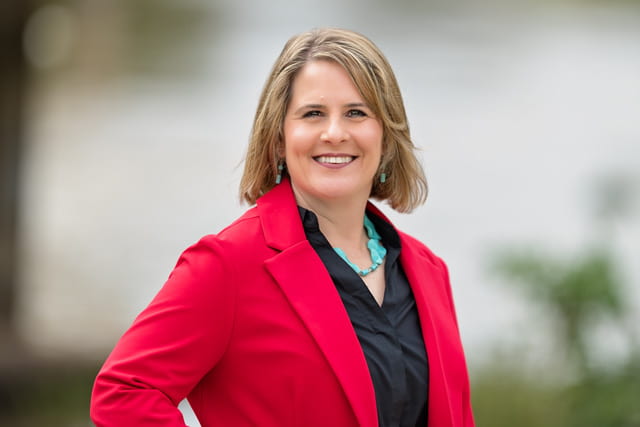Fahrenheit 140: Episode 5
Farmers, ranchers, and landowners increasingly experience the impacts of climate change as severe storms, floods, drought, and wildfire damage their operations and impact their livelihoods. Hosts Robert Mace and Carrie Thompson speak with Kristy Oates, State Conservationist for the U.S. Department of Agriculture’s Natural Resource Conservation Service (NRCS), about working with private landowners to develop conservation (and climate) solutions that support rural Texans.
In this episode, our hosts cover several topics:
- Drought is causing low spring flows and high bacteria levels in many spring-fed systems across the state (01:13)
- Texas could face its third year of La Niña weather conditions, meaning drought will likely continue into the fall and spring (03:45)
- The Meadows Center’s new climate research project will help prepare Texas for climate change (05:47)
- Global warming is causing fewer tropical cyclones (11:49)
- Texas company teams up with a Harvard scientist to combat climate change by reviving the woolly mammoth (16:21)
- Nestlé cut greenhouse gases by 4 million tons since 2018 and will achieve fully recyclable and reusable packaging by 2025 (19:39)
An interview with Kristy Oates:
- Kristy leads conservation services operations within Texas for NRCS (23:59)
- Began her career with NRCS in 1995 as a Soil Conservation Technician (24:36)
- NRCS works in every county across Texas to provide private landowners with services to get conservation on the ground (26:15)
- Offers science-based solutions and targeted conservation practices to help landowners mitigate climate change (28:14)
- Many conservation practices offered by NRCS play an integral role in carbon storage and climate mitigation (30:27)
- The Dust Bowl was the catalyst for the creation of NRCS (31:07)
- Helps landowners build conservation plans and drought management plans and also offers financial assistance through various programs and grants (34:19)
- Rural and urban lands are interconnected; urban areas rely on rural areas to meet their demands for food, water, etc. (41:45)
- NRCS is voluntary, not regulatory – all management decisions are ultimately up to the landowner (44:34)
- Rising temperatures and humidity caused thousands of cattle to die in Kansas (45:51)
- Advice for engaging landowners in the “conservation conversation” (48:00)
Along with some feel-good stories to leave you inspired, like:
- Researchers have found a rare coffee bean species, stenophylla, that is resilient to a hot and dry climate (54:34)
- Scientists are experimenting with transplanting heat-tolerant reef-making species into the Great Barrier Reef to keep the ecosystem alive (57:26)
- Cities are enacting building performance standards to save energy, water, and money (01:00:41)
Articles Mentioned in this Episode:
- Federally funded study will examine how climate change is impacting Central Texas water (San Antonio Report)
- Global Warming Causes Fewer Tropical Cyclones (Scientific American)
- Texas company, Harvard scientist hope to combat climate change by reviving the woolly mammoth (CBS)
- Nestlé Has Cut Greenhouse Gases by 4 Million Tons Since 2018. How? (Environmental Leader)
- Extreme heat and humidity kill thousands of cattle in Kansas (Washington Post)
- To survive climate change, coffee must embrace new and resilient beans (Washington Post)
- Scientists Are Learning How to Help Coral Reefs Save Themselves (AAAS)
Join Our Mailing List
Subscribe to Texas+Water and stay updated on the spectrum of Texas water issues including science, policy, and law.

